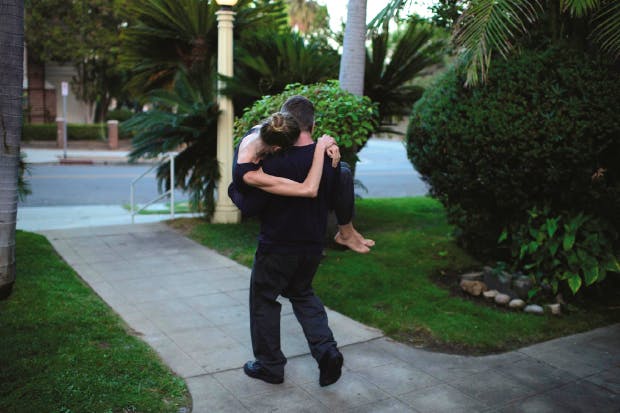Scholarly filmgoers may recall a movement that sprouted from Danish soil called Dogme 95. It worked to a Spartan set of rules and regs. In Dogme titles there could be no lighting and no soundtrack, no locations pretending to be other locations. Hell, there were probably no Portaloos on set and actors fixed their own herring smørrebrød. The director, in an ultimate gesture of klaxonning self-effacement, took no credit. Except that everyone knew Thomas Vinterburg shot Festen and Lars von Trier made The Idiots.
The spirit of cinema’s Mennonites lives on in Chronic, a pitiless, hatchet-faced film set somewhere sunlit in the grassy American suburbs. It is written and shot by Mexican director Michel Franco. His central figure is a middle-aged English agency nurse who cares for clients in God’s waiting room. When you first see David at work he is dousing the naked body of a woman so skeletal it takes a minute to twig that she’s not yet a stiff. His second client is an elderly stroke victim who communicates in furious unconsonanted groans. His last is an abandoned grandmother suffering from terminal cancer.
So not a lot of chuckles (apart from when a boy in a wheelchair tells David to ‘fuck off’). Nor is there much information to work with. The film’s austerity is not merely aesthetic: the camera that never pans, the audio track of domestic noises that abjures the frippery of music. The script is doled out in parsimonious fragments and shards of muttered dialogue. ‘We don’t have to talk,’ says one client, which may as well be Chronic’s strapline. You enter scenes after they’ve begun and leave them before they’ve ended. Alternatively, when nothing is happening, the cut never comes, so you hang about Staring At Emptiness.
And yet through an arrangement of clues an image swims into focus of a carer who on another level doesn’t care at all, indeed scarcely seems to exist. While David is adept at cleansing the vomit-blotched and shit-soiled and dead flesh of his clients, he testily requests a plastic-wrapped towel at the gym. Barely anything registers on his wasteland of a face, even when he stands accused of sexual abuse for showing porn to the stroke victim (who declares that ‘women are unbearable’). He is such an uncontaminated nullity that he claims his clients’ biographies as his own: his wife died of Aids, he becomes an architect.
And yet there is an actual past: an ex-wife, a son whose life was for some reason terminated, which seems to haunt him. There is also a step-daughter he stalks on Facebook, outside her house, and finally on foot. The prolonged take in which the camera prowls after him prowling after her is one of the carefully rationed moments when the film feels intensely powerful and present, and David’s ghostliness is fully revealed.
Tim Roth is in every scene. His performance is a far cry from his antic factory setting. In a sort of double act of post-punk Eighties spivvydom alongside Gary Oldman, he went to Hollywood mostly to play dastards, from Rob Roy to last year’s Selma. Though a Tarantino company member, he has never quite landed a late-period role to match Oldman’s sphinx-like George Smiley (unless you wish to count his Sepp Blatter or his Prince Rainier). Roth has rarely done anything so carefully neutral. Using a form of anti-acting, he portrays absence of empathy as absence of personality. He plays each scene as if in a businesslike impatience to get the take done.
Chronic is not quite a thinkpiece about euthanasia. It’s more a morality tale about the care industry, and sanitised western societies that hand their dying over to whoever. It is also an unblinking corrective to the (in comparison) dayglo emotionalism of Almodóvar’s Talk to Her, which visited the same territory. ‘Do you want a shower?’ David asks his last client. ‘No, I want to die.’
Who finally is David? Grief-stricken guardian against death or stealthy executioner? The mystery is the film’s strength and flaw. In the end Franco’s relentless stinginess feels a little too thorough to encourage investment. The last two scenes deliver two shocks to the heart that are a grim reward for the foregoing 90 minutes. Cinema needs films like Chronic. Just not a lot of them.
Got something to add? Join the discussion and comment below.
Get 10 issues for just $10
Subscribe to The Spectator Australia today for the next 10 magazine issues, plus full online access, for just $10.














Comments
Don't miss out
Join the conversation with other Spectator Australia readers. Subscribe to leave a comment.
SUBSCRIBEAlready a subscriber? Log in